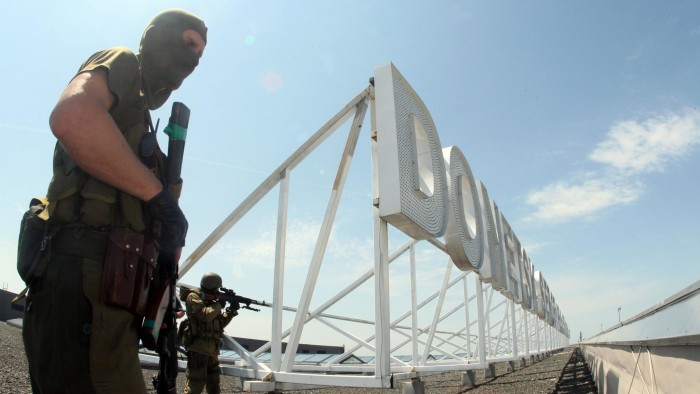A surreal week with the Donetsk rebels


Roula Khalaf, Editor of the FT, selects her favourite stories in this weekly newsletter.
Alexei, a 28-year-old historian, was walking down the street in his home town, Donetsk, a couple of weeks ago when armed men from the “Vostok” battalion stopped him, bundled him into their car and drove off.
The incident was the start of a surreal week. Alexei had become the latest Donetsk resident to be abducted by pro-Russian separatists who have controlled the city since April. There followed six days of forced labour. He was brought to a rebel checkpoint in Pervomaiske, a small village northwest of Donetsk, and forced to dig trenches, fill sandbags and, occasionally, peel potatoes. He twice came under heavy shelling by Ukrainian troops, who were stationed close by.
Alexei is fairly forgiving of his captors. “At least they didn’t beat me up,” he says. They also fed him regularly and gave him cigarettes. People he knows who were seized by a different rebel unit – the Russian Orthodox Army – were physically abused and kept in a damp, dark cellar, while he slept in the relative comfort of an abandoned cottage.
Alexei’s story is not an isolated case. A UN report this week said eastern Ukraine was seeing a “total breakdown of law and order”, and accused armed groups of instituting “a reign of fear and terror”. The insurgents, it said, were continuing to abduct, detain, torture and execute people kept as hostages, exercising their power over the population “in raw and brutal ways”.
And the people of Donetsk have a new danger to contend with: intense fighting on the outskirts between rebel units and Ukrainian government troops, who have made tangible gains in the past two weeks. Every night the boom of shelling reverberates around the city. Every morning residents wake to find buildings ruined by bombardments that do not discriminate between combatants and civilians. The death toll is rising.
Donetsk has totally changed since the last time I was here two months ago. Then, it was hard to believe this city of 1m souls was at the centre of one of the worst east-west crises since the cold war. Its beautifully landscaped parks were full of people enjoying the spring sunshine. Outdoor cafés were overflowing: shops and markets were doing a roaring trade. People dismissed the rebels who had seized Donetsk’s regional government building in April as a bunch of clowns.

Not any more. The insurgents now provoke fear, not ridicule. Some of them have exploited the total absence of any police force to steal cars and loot shops. Vigilante justice rules: Alexei’s supposed offence was drinking beer in public.
Tens of thousands have fled the city. The railway station swarms with hundreds of residents queueing for hours to get a ticket out of here. The city centre is devoid of people. Shops are boarded up: many ATMs have run out of cash.
The circus-like atmosphere has also gone. The first wave of rebels – small-time activists and romantics who dreamt for years of union with Mother Russia – has been pushed aside by professionals from Moscow. Igor Strelkov, the rebels’ military commander, and Vladimir Antyufeyev, their security chief, are both Russian citizens. The latter used to be head of internal security in Transnistria, the Russian-backed breakaway region in Moldova.
Meanwhile, the barricades of tyres, barbed wire and sandbags that surrounded the occupied government building have been cleared, and the interior smartened up. Even the lifts work now. But popular disquiet with the rebel regime is widespread, even if still expressed mainly behind closed doors. A common graffito is a portrait of Mr Strelkov with a gun to his head and the words “Just Do It”.
Alexei escaped his captors by spinning an elaborate ruse. They thought, wrongly, that he was a drug addict. So he told them that, if they released him, he would cook them some crystal meth. He was released on condition he brought them the meth – but never returned.
He says about 10 per cent of men abducted by the rebels are persuaded to join the insurgency. That was never going to happen to Alexei. “I was worried they’d find out I was completely against them, that I support a united Ukraine,” he said. He contemplated running away to Ukrainian-controlled territory but feared being taken for a spy.
Since he was set free, the Pervomaiske checkpoint has been destroyed and the area is now controlled by Ukrainian troops. How does he assess the rebels’ chances now? “This whole thing will peter out soon,” Alexei says, “as soon as Russia stops paying them.”
Comments